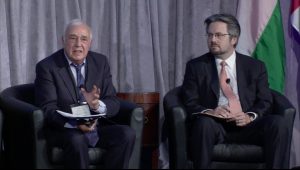Perry Mehrling wears many hats around INET, serving on our Advisory Board, chairing the US committee of the Economics Curriculum Task Force, and writing The Money View blog each week. On top of all that, he can add another feather to his cap: author of the book “The New Lombard Street, How the Fed Became the Dealer of Last Resort.”
In this INET video interview, Mehrling, a Professor of Economics at Barnard College, Columbia University, discusses the main ideas of the book. The book, which Bloomberg hailed as one of the top 10 business books of 2011, traces the evolution of institutions in the American banking system since the establishment of the Federal Reserve in 1913 right up until the great financial collapse of 2008.
Mehrling’s interview with INET Executive Director Rob Johnson spans a number of topics of great import to economic discussions today. He describes the fundamental shift over the last couple decades from a bank lending system to a capital markets system – and how government regulations have failed to track and adjust to this shift. He goes where most other academics don’t and explains the “plumbing” of today’s shadow banking system that is critical to understanding how money markets truly work.
Mehrling attributes many of the problems of contemporary economics to its gradual disengagement from the real world of the economy over the years. However, he is cautiously optimistic that the crisis has prompted a critical reevaluation of the old paradigm, a fresh look at new data, and the beginnings of the formulation of new, more accurate theories.
Here’s where Mehrling’s work on the book joins with his work within INET in accelerating the pace of new thinking in the profession. For better insight into the challenges facing that profession, and some of the possible solutions, do watch Mehrling’s full interview, or the individual segments of more focused topics. And spread the word of the ones you like.


